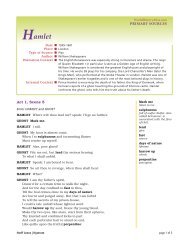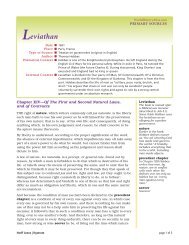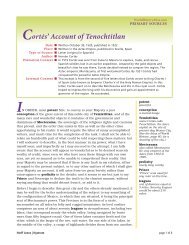Funeral Oration by Pericles - Nystrom's World History Atlas website
Funeral Oration by Pericles - Nystrom's World History Atlas website
Funeral Oration by Pericles - Nystrom's World History Atlas website
You also want an ePaper? Increase the reach of your titles
YUMPU automatically turns print PDFs into web optimized ePapers that Google loves.
<strong>World</strong><strong>History</strong><strong>Atlas</strong>.comPRIMARY SOURCES<strong>Funeral</strong> <strong>Oration</strong> <strong>by</strong> <strong>Pericles</strong>Date ■ 431 B.C.Place ■ Athens, GreeceType of Source ■ Speech (original in ancient Greek)Author ■ <strong>Pericles</strong>, as recalled <strong>by</strong> the historian ThucydidesHistorical Context ■ The Athenians honored soldiers who died in battle <strong>by</strong> having a famous citizengive a speech after their military funeral. This speech was given <strong>by</strong> <strong>Pericles</strong>, thegreatest statesman of Athens, at the end of the first year of the PeloponnesianWar (see <strong>Atlas</strong> of <strong>World</strong> <strong>History</strong>, pages 32–33). <strong>Pericles</strong> used his speech to bothhonor the fallen soldiers and to rally those in attendance to continue fightingthe Peloponnesian War. Here he champions the Athenian cause <strong>by</strong> describingthe virtue of their democracy and freedom.Two years after giving this speech, <strong>Pericles</strong> died of plague (ironically broughtabout largely <strong>by</strong> <strong>Pericles</strong>’ own strategy). After years of fighting, Athens wasforced surrendering to Sparta.Our constitution does not copy the laws of neighboring states; we arerather a pattern to others than imitators ourselves. Its administration favorsthe many instead of the few; this is why it is called a democracy. If we lookto the laws, they afford equal justice to all in their private differences; if nosocial standing, advancement in public life falls to reputation for capacity,class considerations not being allowed to interfere with merit; nor againdoes poverty bar the way, if a man is able to serve the state, he is nothindered <strong>by</strong> the obscurity of his condition. The freedom which we enjoy inour government extends also to our ordinary life. There, far from exercisinga jealous surveillance over each other, we do not feel called upon to beangry with our neighbor for doing what he likes, or even to indulge in thoseinjurious looks which cannot fail to be offensive, although they inflict nopositive penalty. But all this ease in our private relations does not make uslawless as citizens. Against this fear is our chief safeguard, teaching us toobey the magistrates and the laws, particularly such as regard theprotection of the injured, whether they are actually on the statute book, orbelong to that code which, although unwritten, yet cannot be brokenwithout acknowledged disgrace.Further, we provide plenty of means for the mind to refresh itself frombusiness. We celebrate games and sacrifices all the year round, and theelegance of our private establishments forms a daily source of pleasure andhelps to banish the spleen; while the magnitude of our city draws theproduce of the world into our harbor, so that to the Athenian the fruits ofother countries are as familiar a luxury as those of his own.If we turn to our military policy, there also we differ from our antagonists.We throw open our city to the world, and never <strong>by</strong> alien acts excludeforeigners from any opportunity of learning or observing, although the eyesof an enemy may occasionally profit <strong>by</strong> our liberality; trusting less inconstitutionthe Athenian constitutionwas unwrittenobscurityhardshipjealoussuspiciouspositive penaltygood outcomemagistratesjudgesspleenbad temperalien actslaws to prohibitoutsiders from enteringliberalityopennessHerff Jones | Nystrom page 1 of 2
<strong>Funeral</strong> <strong>Oration</strong> <strong>by</strong> <strong>Pericles</strong><strong>World</strong><strong>History</strong><strong>Atlas</strong>.comPRIMARY SOURCESsystem and policy than to the native spirit of our citizens; while ineducation, where our rivals from their very cradles <strong>by</strong> a painful disciplineseek after manliness, at Athens we live exactly as we please, and yet arejust as ready to encounter every legitimate danger. In proof of this it may benoticed that the Lacedaemonians do not invade our country alone, butbring with them all their confederates; while we Athenians advanceunsupported into the territory of a neighbor, and fighting upon a foreign soilusually vanquish with ease men who are defending their homes. Our unitedforce was never yet encountered <strong>by</strong> any enemy, because we have at once toattend to our marine and to dispatch our citizens <strong>by</strong> land upon a hundreddifferent services; so that, wherever they engage with some such fraction ofour strength, a success against a detachment is magnified into a victoryover the nation, and a defeat into a reverse suffered at the hands of ourentire people. And yet if with habits not of labor but of ease, and courage notof art but of nature, we are still willing to encounter danger, we have thedouble advantage of escaping the experience of hardships in anticipationand of facing them in the hour of need as fearlessly as those who are neverfree from them.system and policylaws and rulesmanliness<strong>Pericles</strong> is saying thatwhile Spartans train tobe brave, Athenians areinherently brave.LacedaemoniansSpartansunsupported<strong>Pericles</strong> is exaggeratinghere. Though Athens didoccasionally fight battlesunassisted, they oftenhad allies.marinenavySource: Thucydides, “<strong>Pericles</strong>’ <strong>Funeral</strong> <strong>Oration</strong> from the Peloponnesian War,” Ancient<strong>History</strong> Sourcebook, August, 2000, (May 24, 2011).Herff Jones | Nystrom page 2 of 2
















